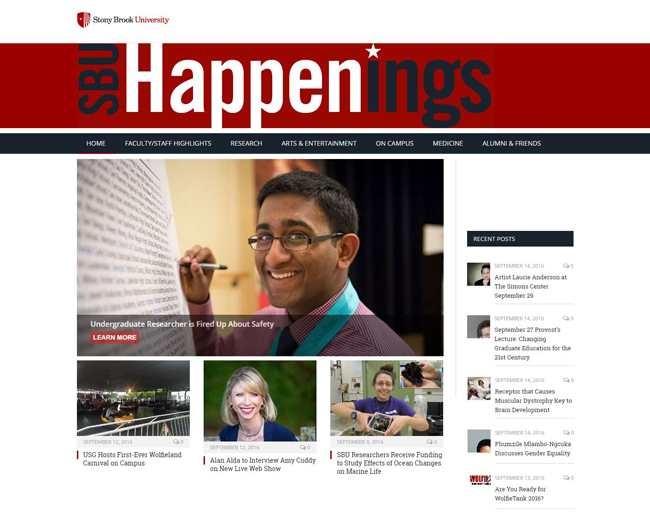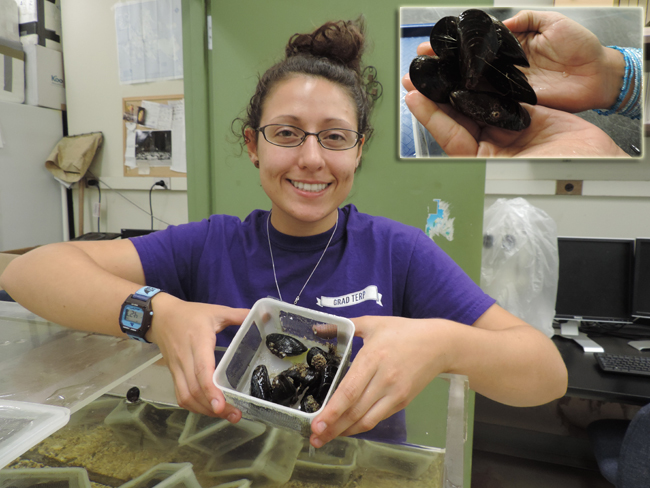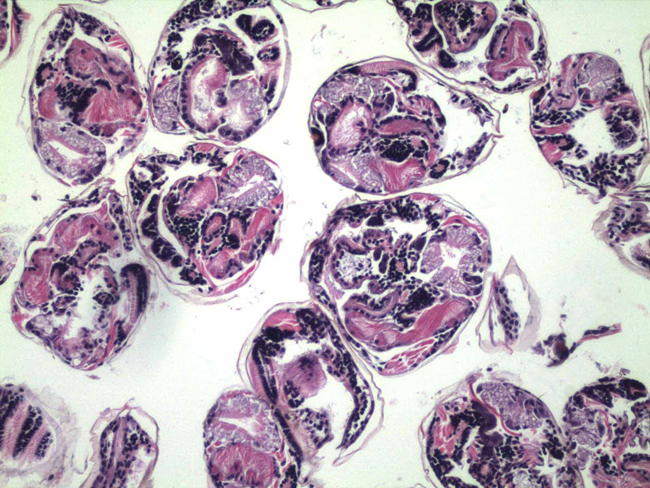Published for Stony Brook University's E-news Site, Happenings

Stony Brook, NY, September 9, 2016 - Stony Brook researchers Dianna Padilla and Bassem Allam have been awarded funding from NOAA’s Ocean Acidification Program and the Northeast Sea Grant Programs to study the effects of ocean acidification on marine life in the Northeast.
These studies will will help investigators gain a better understanding of effects of ocean changes on the region’s marine life, helping to preserve endangered species.
Burning fossil fuels releases large amounts of carbon dioxide into our atmosphere, a part of which is absorbed by the ocean. This increase in carbon dioxide is causing a change in ocean chemistry called ocean acidification. Learning how these changes affect seafood is important to fishermen and all those whose enjoyment and culture is connected to the sea.

Blue mussels were collected from Long Island Sound where they experience different environmental conditions. Allison Rugila (pictured) is a graduate student in Ecology and Evolution and is the Sea Grant Fellow on this project (photos courtesy of Dianna Padilla).
Dianna Padilla, a professor in the Department of Ecology and Evolution at Stony Brook, has been awarded $185,435 to explore whether blue mussels can adapt to changes in ocean chemistry. Her team will examine mussels throughout their life cycles, across multiple generations, to assess their ability to adapt and determine if mussels from certain areas of Long Island Sound are better able to cope with varying acidification conditions. This information can then be used to help shellfish growers determine where to collect mussels to spawn for seed and improve stocks of mussels for aquaculture in the long run.

Histological sections of hard clam juveniles under the microscope (photo courtesy of Bassem Allam)
Bassem Allam, Marinetics Endowed Professor in Marine Sciences at Stony Brook University, has received $199,927 to compare how different bivalves respond to acidification. Bivalves such as oysters and clams represent the most important marine resource in several Northeast states and production of bivalve seed has suffered significant losses due to ocean acidification in some of the largest hatcheries in the nation. His team will identify genetic features associated with resilience in an aim to provide the aquaculture industry with tools to select resilient shellfish stocks.
“Global warming will increase CO2 levels in the ocean and make the ocean more acidic,” said William Wise, director of New York Sea Grant. “These effects will probably be accentuated in coastal waters as compared to the open ocean. This work by Padilla and Allam will identify the vulnerabilities to OA of ecologically and economically important local shellfish species in New York, and assess their relative ability to adapt to these impending environmental changes. New York Sea Grant is pleased to help support this important research.”
More Info: New York Sea Grant
New York Sea Grant (NYSG), a cooperative program of Cornell University
and the State University of New York, is one of 33 university-based
programs under the National Sea Grant College Program (NSGCP) of the
National Oceanic and Atmospheric Administration (NOAA). The NSGCP
engages this network of the nation’s top universities in conducting
scientific research, education, training and extension projects designed
to foster science-based decisions about the use and conservation of our
aquatic resources. Through its statewide network of integrated
services, NYSG has been promoting coastal vitality, environmental
sustainability, and citizen awareness about the State’s marine and Great
Lakes resources since 1971.
New York Sea Grant maintains Great Lakes offices at SUNY Buffalo, the
Wayne County Cooperative Extension office in Newark and at SUNY Oswego.
In the State's marine waters, NYSG has offices at Stony Brook University
and Stony Brook Manhattan, in the Hudson Valley through Cooperative
Extension in Kingston and at Brooklyn College.
For updates on Sea Grant activities: www.nyseagrant.org has RSS, Facebook, Twitter, and YouTube links. NYSG also offers a free e-list sign up via www.nyseagrant.org/coastlines for its flagship publication, NY Coastlines/Currents, which is published several times a year.